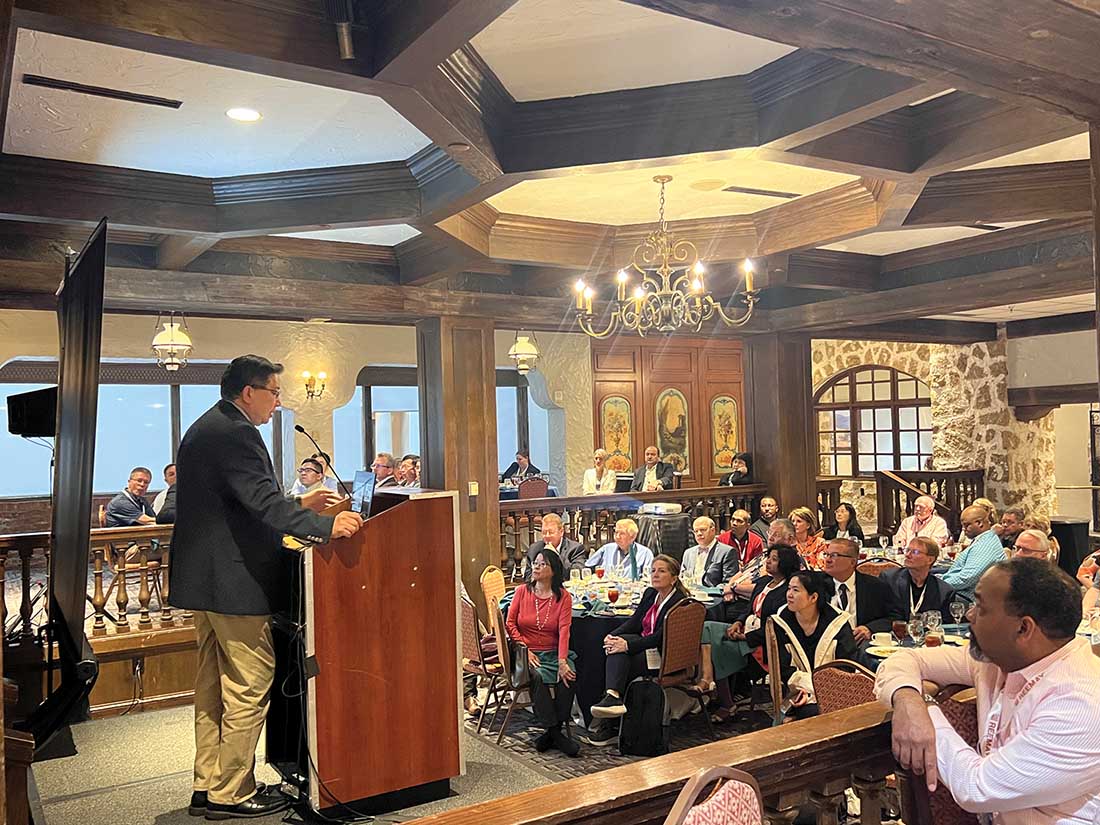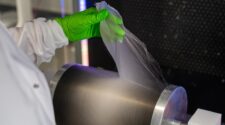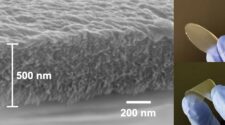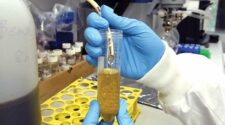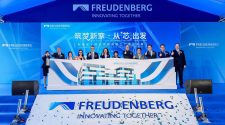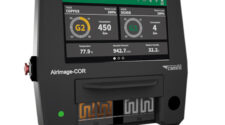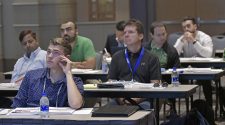AFS Welcomes Experts Converging in Houston, Texas to Deliver the Latest in Filtration Research & Development
In the backdrop of a historic total solar eclipse on April 8 in the U.S. – the next one occurs in 2044 – American Filtration and Separations Society’s FILTCON 2024 event was located in Houston, Texas, boasting a 94% view of the eclipse. The popular AFS Expo hosted about 40 exhibitors from across the filtration supply chain and included 20 Latest and Greatest presentations on exhibitor offerings.
The show kicked off strong with a day of short courses, followed by a plenary session from Dr. Rigoberto Advincula, University of Tennessee, on “Additive Manufacturing & Membrane for High Performance.” His talk centered around research with 3D printing, machine learning, and polymers.
Most interestingly, he discussed the potential of super hydrophobic surfaces, inspired by nature, to reduce fouling in filtration and membrane systems. His team used 3D printing methods to create super hydrophobic surfaces with optimized variables, including shear thinning behavior, yield stress, and storage modules.
In one experiment, the team set out to recreate the surface of a lotus leaf, a super hydrophobic film in nature, from polymers. Their study yielded a “super” lotus leaf, better than the leaf in its origins, that has water repelling properties preventing bio fouling and improving filtration and membrane performance potentially in oil and gas.
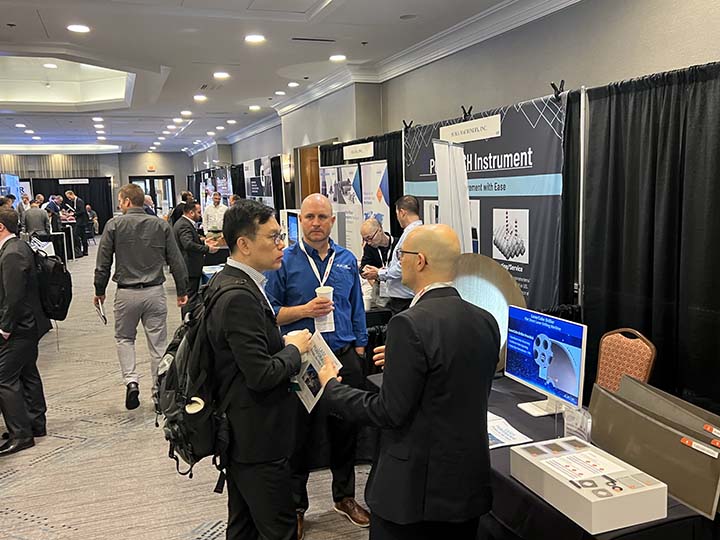
Advincula believes the use of 3D printing and AI machine learning advancements are the next step in research and development in filtration. “It’s an energy saver, because instead of doing trial and
error in your R&D, you can be more directed in the science domain by using machine learning. And, in fact, you can go even further if you want, all the way to the supply chain to the cost of energy to the different types of media in process integration and system engineering,” he says.
Furthermore, he notes that machine learning has the potential to revolutionize chemical engineering, as an example, predicting chemical reactions and optimizing process conditions.
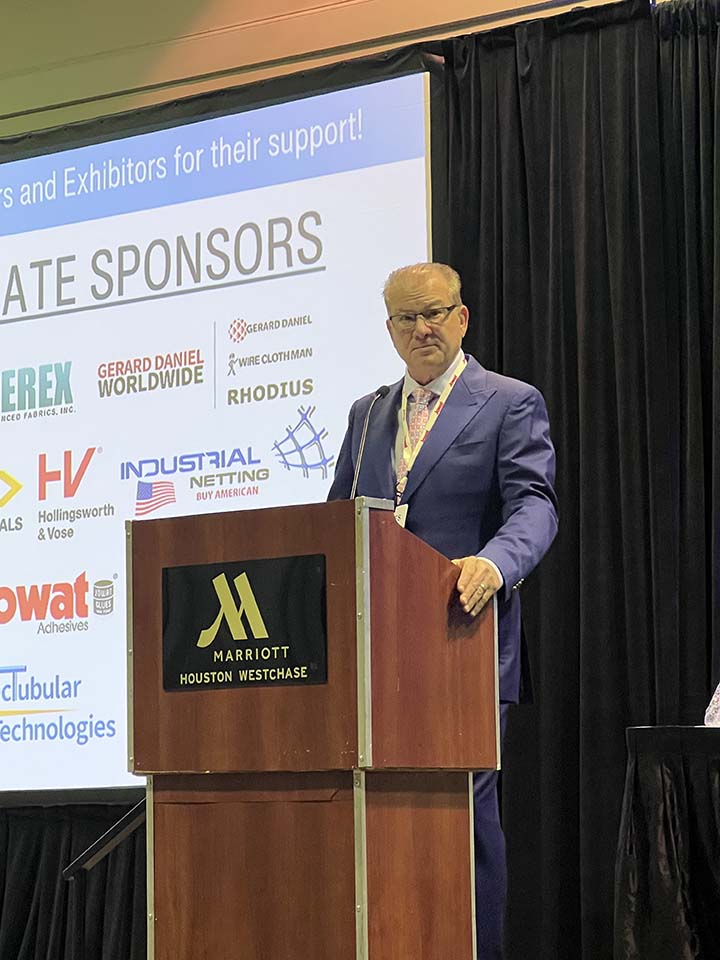
Len Castellano, AFS Chair, welcomed attendees prior to the second Plenary session, and announced Connie Rhea as the new Executive Director of AFS.
In the next plenary session, Trey Hamblet of Industrial Info Resources (IIR) spoke on “Industrial Market Spending Outlook,” and focused much of his talk on ESG. “At this moment, when you look at everything that we’re tracking around the world, there’s just short of $500 billion worth of investment spend that is very specifically ESG – environmental social governance – motivated spending. Right here in our backyard [U.S.], we represent $151 billion of that,” he says. Meanwhile, the adoption and investment in green hydrogen faces challenges, and the investment in carbon capture and alternative fuels in the refinery industry is uneven between refiners and petrochemical producers, and there is growth in renewable diesel in North America.
“In showing the overall spend for the North America [U.S. and Canada], we’ve continued to see spending in the petroleum refinery industry ticked up, which is incredibly intriguing. … When you think about all the closures that we’ve seen across the refining industry to see spending to come back up to this level is impressive and encouraging. You know, crude price, obviously, that’s something that everyone who owns or operates refinery wakes up in distress about every day, we’re at the margins. And so where prices are right now is certainly a constraint to some degree. Domestic demand, I talked about that electric vehicles sneaking up on a parking lot earlier. There was concerns about loss of domestic demand due to the EV revolution. On the driver side, we’ve continued to see production in the field in the oil and gas industry remain incredibly impressive.”
Reflected in the panel discussion moderated by Dr. Wu Chen on “Carbon Capture – Filtration and Separation,” the continued strength of the gas and oil industry is evident in the slow growth of these technologies. Panelists included Tiffany Chen, BASF, Andreas Scope, MANN + HUMMEL, and Martin A. Taylor, Bechtel Energy technologies & Solutions. The panel focused on various carbon capture technologies, emphasizing the importance of selecting the appropriate technology based on CO2 concentration. They also shared the goals of the process and the importance of contamination control, as well as water quality standards for industrial facilities, explaining the need to maintain low levels of total suspended solids in the system.
Overall, the panel noted there is much work to do in this area to increase return on investment in order to increase effectiveness and sector participation.
On the sustainability track, David Huber, from CLEAResult, a presenting sponsor, spoke on the ability for organizations to get government grant funding towards achieving sustainability targets for the companies that can report data on key energy metrics. He emphasized the urgent need to reduce fossil fuel consumption in industrial settings, citing the importance of decarbonizing the grid and avoiding carbon double bonds. He also stressed the need for small and medium-sized industries to prioritize energy audits and invest in emissions-reducing projects in order to be ready for the rigorous application process when funds are made available.
Awards Take Center Stage
The prestigious AFS awards highlight achievements in filtration and separation.
Lifetime Achievement Award – Dr. Wu Chen
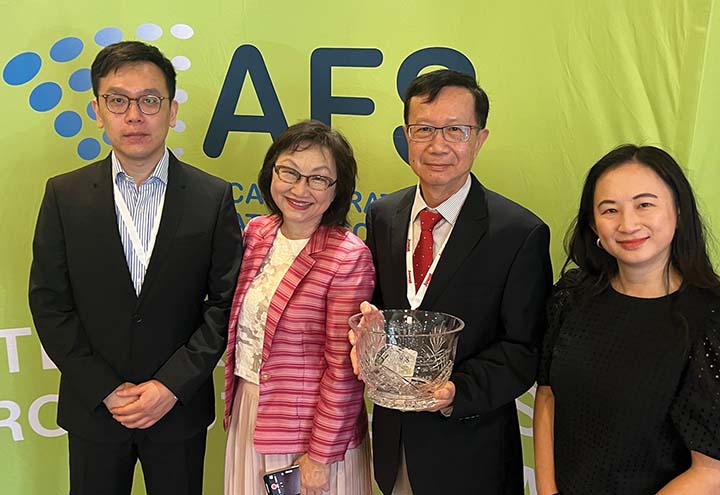
Dr. Wu Chen, pictured with his family, recently retired as an R&D Fellow at Dow. He has over 30 years of industrial experience in solid/liquid separation and air/gas filtration in technologies and filtration markets. He also has expertise in project management, process design and plant startup.
With 40 years of experience in solid/liquid separation, Dr. Chen has served AFS with great passion since the Society was founded, as a pillar in the acceleration of the Society’s development. He is currently the chair of the AFS Education Committee and the coordinator of AFS short courses. He has been the chair of AFS, the board of directors, conference chairs, local chapter officers and served on various committees.
He has received the AFS Frank Tiller Award for outstanding technical achievement, the AFS Well Shoemaker Award for leadership and service to the filtration industry, and the Fellow Member Award for sustained significant contributions to filtration technologies and industry.
Frank Tiller Award – Dr. Tinoush Dinn
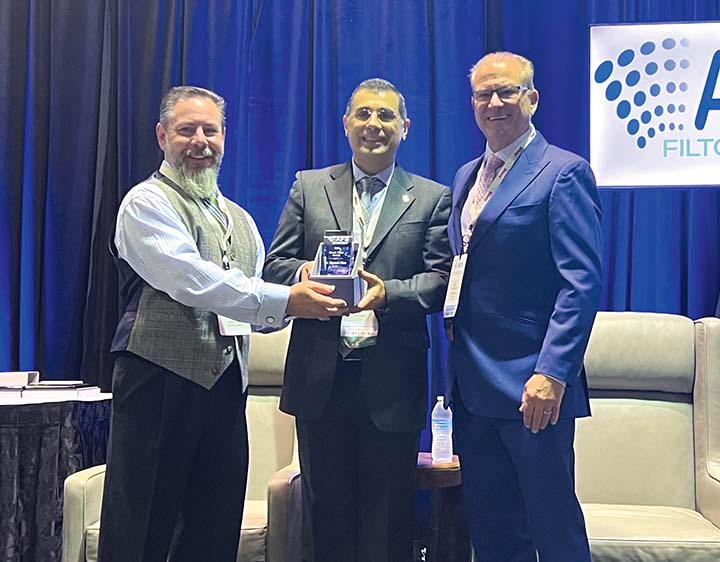
Dr. Tinoush Dinn has been with BASF Corporation since 2015 as a Senior Global Process and Chemical Engineering Research Engineer. As a member of the solids processing group, Dr. Dinn supports BASF North America and global operations and performs R&D, process development, scale-up (lab to pilot and plant) process design, and optimization for solid-liquid and membrane separation processes. Before this position, he worked as a research engineer and project manager in multiple industries, such as mining and minerals, oil and gas, and water and wastewater treatment, for over 12 years with backgrounds in operation, design, research, modeling and simulation of separation processes.
Wells Shoemaker Award – Mr. Chris Wallace
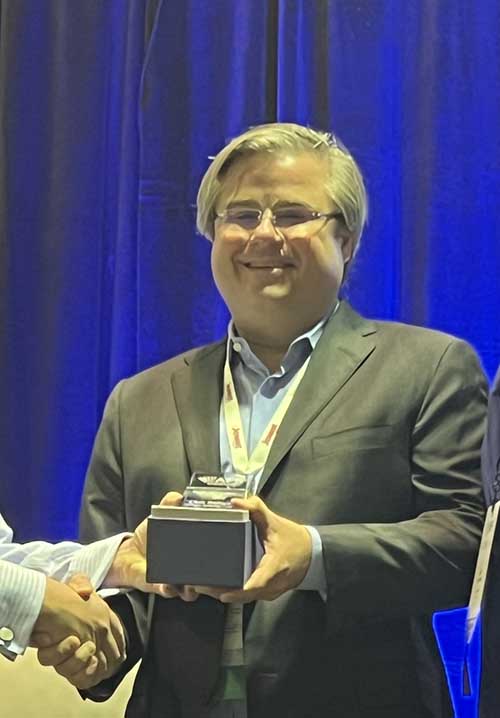
Mr. Chris Wallace is the VP of Technology and Sr. Corporate VP for Filtration Technology Corporation (FTC) in Houston, TX. Since he joined FTC in 2003, he has been involved in production engineering, application engineering, research and development, and technical sales and marketing of filtration and separation products for liquid/solid, gas/solid, liquid/liquid and gas/liquid applications. He holds a B.S. in Biomedical Engineering from Tulane University.
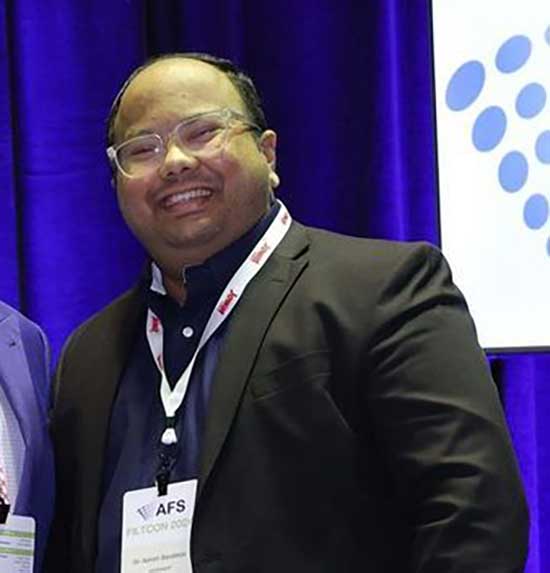
Senior Scientist – Dr. Ashish Bandekar
Dr. Ashish Bandekar is a Senior R&D Engineer Manager at Gessner. A published author and patent-holding engineer, he has worked in developing meltblowns and designing filters for various industrial
sectors for the past seven years. He earned his Ph.D. from the University of Akron under the guidance of Professor George Chase. Before joining Gessner, he held positions with FTC,
Lydall and Entegris.
Young Scientist – Dr. Harshal Gade and Dr. Jianyu “Jerry” Zhou
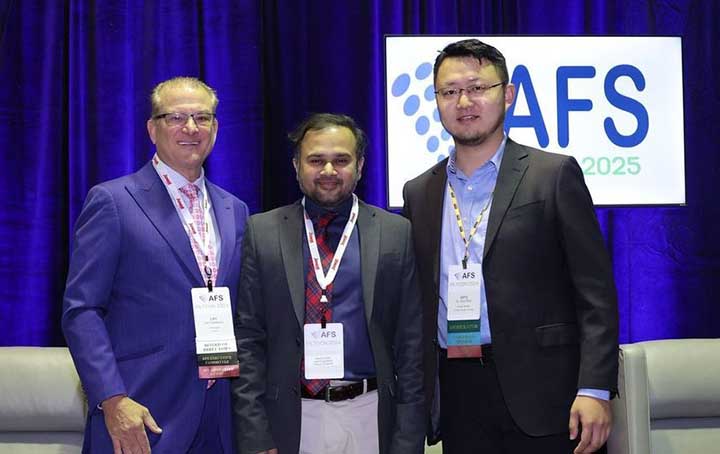
During his Ph.D. program, Dr. Harshal Gade, center, focused his research efforts across disciplines of physics, chemistry, and polymer science to study the charge-polarization of polymeric nanofibers. He recognized that the practical use of charged fibers (also known as electrets) had two main challenges: accurate and sensitive charge measurement and proper handling and storage of the fiber materials did not adversely affect the charge. To address the first challenge, Dr. Gade fabricated a custom-made Faraday Bucket sensitive enough to detect less than one-volt changes on fiber mats. He applied a source-free resistance-capacitance circuit model to evaluate the voltage-time data to calculate the amount of charge carried by the fiber samples.
Dr. Jianyu “Jerry” Zhou (right, in photo) holds a Ph.D. in Chemical Engineering from the University of Akron, where he systemically studied filtration theories, material, characterization and applications with Professor George Chase.
Currently, Dr. Zhou works as a Senior Project Engineer for Parker Hannifin. He is based in the Parker Filtration Innovation Center and focuses on filter media applications and filtration material development to connect with Parker’s diversified needs in applications in filtration industry. Dr. Zhou has been an active member in AFS since 2015. He is co-chair of FiltCon 2024 and serves on the AFS Education Committee.
Professor George Chase Award – Dr. Pratik Gotad
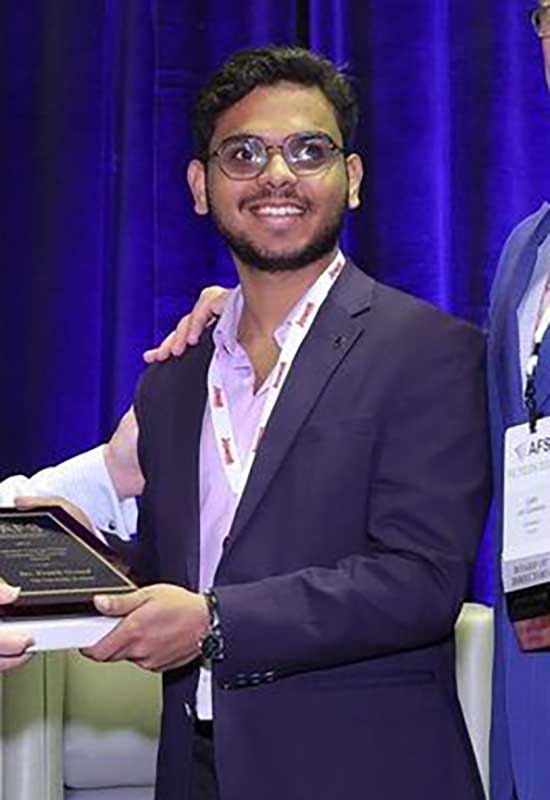
Dr. Pratik Gotad is a 5th year Ph.D. student in the School of Polymer Science and Polymer Engineering at the University of Akron. He completed his B. Tech in Polymer and Surface Coating Technology at the Institute of Chemical Technology; he was a Gold medalist for his undergraduate batch. His Ph.D. thesis focused on developing novel functional polymer aerogel media for applications in liquid-liquid filtration and separation of small organic molecules such as PFAS and surfactants from liquids. Professor Sadhan Jana also received a plaque as Dr. Gotad’s professor.
New Product Award – GKD-USA – VORTEX Separation Unit
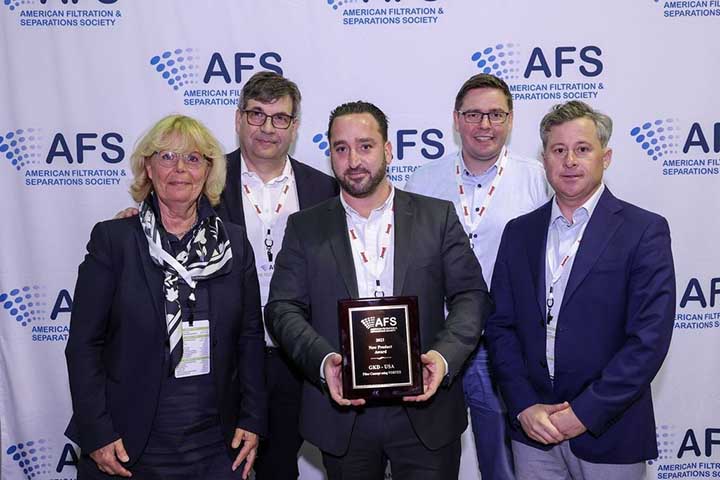
Vortex is a biomimetic solution adapted from the same natural processes that enable basking sharks and manta-rays to filter their food without clogging their gills. Instead of attracting particles to a filter surface, Vortex forms fluid patterns that suspend and isolate the particles into a continuous vortex – separating them from fluids and channeling them into a capture unit for removal.
The spiral forms a continuous vortex within inflowing fluids, separating unwanted particles into a concentrated stream that can be channeled into a capture unit for removal. This design vastly outperforms conventional filtering systems.
Engineering Merit Award – MayAir – Constant-Efficient Intelligent HEPA Box and Return Air Inlet
The Intelligent HEPA Box and Return Air Inlet can be adjusted remotely and quickly through the built-in air volume control valve. The air volume can be fed back to the central control room at the same time, realizing the rapid intelligent switching of working mode. Meanwhile, the rational structure of the product and no wearing fittings make it easy to overhaul and maintain.


